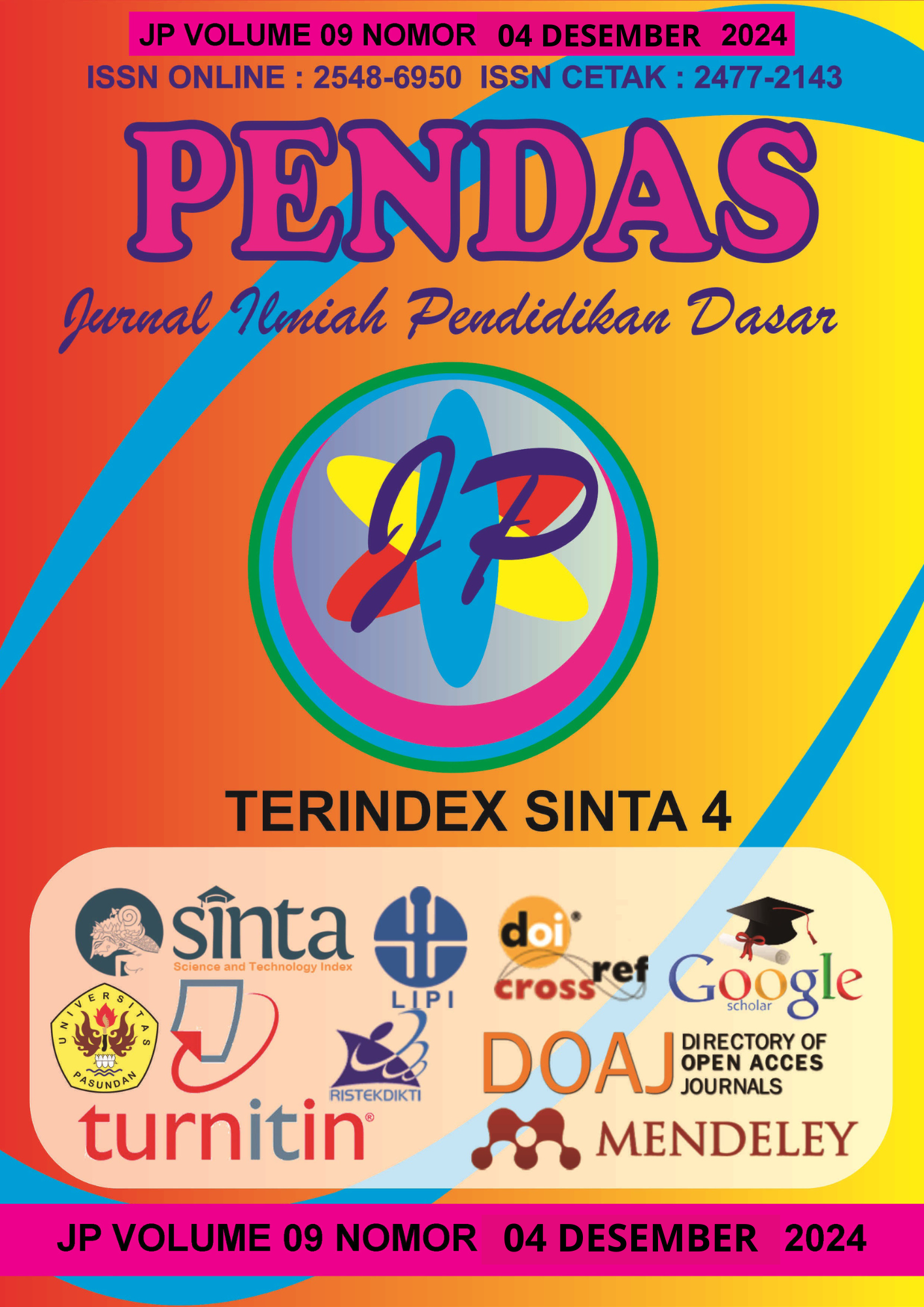PENERAPANCOGNITIVE LOADTHEORYDALAMSISTEMPEMBELAJARAN
DOI:
https://doi.org/10.23969/jp.v9i04.23230Keywords:
Cognitive Load Theory,, Effective Learning, Learning StrategiesAbstract
This article discusses the application of Cognitive Load Theory (CLT) in the
context of learning systems aimed at improving the effectiveness of student
learning processes. Introduced by John Sweller in the late 1980s, the theory
explains that each individual has a limited capacity to process information.
Therefore, it is crucial to manage cognitive load to enable students to learn
optimally. CLT identifies three types of cognitive load: intrinsic load, which is
related to the complexity of the material; extraneous load, which arises from the
method of presenting information; and germane load, which is related to the
mental effort that supports the learning process. The application of this theory in
educational practice involves designing instructional materials and learning
strategies that consider students' mental capacities. By avoiding excessive
information delivery, using visual aids that support understanding, and organizing
information effectively, students can focus more on processing relevant
information. This study employs a literature review method to gather information
from various sources related to the implementation of CLT in education. The
research concludes that the application of CLT can enhance students'
understanding and retention of information. However, challenges in its
implementation include the need to adjust the material according to students'
readiness levels and educators' deep understanding of effective instructional
design. In conclusion, the application of CLT is critical for creating a more efficient
and effective learning experience.
Downloads
References
Abdus, Syakur, I. Ardana, I. Degeng, and Punaji Setyosari. 2017. “Pengaruh Beban Kognitif Pembelajaran Multimedia Dan Pengetahuan Awal Terhadap Hasil Belajar Apilkasi Keterampilan Pengolah Angka Mahasiswa Perbankan Syariah STAIN Pamekasan. Repository, 9(3), 1–.” Repository 9(3):1–32. Garnasih, Tuti. 2018. “Kemampuan Siswa Dalam Mengelola Extraneous Cognitive Load Pada Pembelajaran Klasifikasi Tumbuhan Menggunakan Tayangan Video.” Dengan Apersepsi Jurnal BIOEDUIN 8(2):29–33. doi: 10.15575/bioeduin.v8i2.3189. Haryati, Bella, Yuyu Yuhana, and Yani Setiani. 2023. “Pengembangan Bahan Ajar E Learning Berbasis Cognitive Load Theory.” Wilangan: Jurnal Inovasi Dan Riset Pendidikan Matematika 4(3):184–92. Lesmana Sari, Eka, Billyardi Ramdhan, and Windyariani. 2020. Sistiana “Beban Kognitif Siswa Pada Materi Pencemaran Lingkungan Berbantuan Prezi Application.” Biodik 6(3):233–41. doi: 10.22437/bio.v6i3.9840. Lolang, E., F. Salsabyla, A. Suhud, Unan Yusmaniar Oktiawati, and Almira Ulimaz. 2023. “Beban Kognitif: Extraneous Cognitive Load (Ecl) Siswa Yang Dipengaruhi Oleh E-Learning Berbasis Google Classroom.” Paedagoria: Jurnal Kajian, Penelitian Dan Pengembangan Kependidikan6356:184–91. Mayasari, Novi. 2017. “Linier Di Ikip PgriBojonegoro.”2(1):1–7. Nasution, Marina Azzahra, and MuhyiatulFadilah.2024. “Analisis Beban Kognitif Peserta Didik PadaMateri Sel Kelas XI IPA MAN 3 Kota Padang.” Jurnal Bioshell 13(1):37–48. doi: 10.56013/bio.v13i1.2759. Richardo, Rino, and Rima Aksen Cahdriyana. 2021. “Strategi Meminimalkan Beban Kognitif Eksternal Dalam Pembelajaran Matematika Berdasarkan Load Cognitive Theory.” Humanika 21(1):17–32. doi: 10.21831/hum.v21i1.38228. Sari, Fifi Fitriana. 2022. “Pembelajaran Dasar-Dasar Statistik Mengacu Pada Teori Beban Kognitif (Cognitive Load Theory) Untuk Meningkatkan HasilBelajar.”MediaPendidikan Matematika 10(2):31. doi: 10.33394/mpm.v10i2.6531. Setyawan, Dedy, and chandra anugrah Putra. 2020. “PENGARUH LOGIC MATHEMATIC INTELLEGENCE DAN COGNITIVE LOAD THEORY TERHADAP HASIL BELAJAR MATEMATIKA.” HOLISTIKAJurnal IlmiahPGSD 4(2):96–100. Sholihah, Dyahsih Alin. 2022. “Strategi Pembelajaran Matematika Berdasarkan Cognitive Load Theory Untuk Meminimalkan Extraneous Cognitive Load.” EQUALS: Jurnal Ilmiah Pendidikan Matematika 5(1):13–23. doi 10.46918/equals.v5i1.1197. Sunawan, Sunawan, Sugesti Yoan AhmadYani,CatharinaTriAnna, Trubus Inggariani Kencana, Mulawarman, and Afriyadi Sofyan. 2017. “Dampak Efikasi Diri Terhadap Beban Kognitif DalamPembelajaranMatematika Dengan Emosi Akademik Sebagai Mediator.” Jurnal Psikologi 44(1):28. doi: 10.22146/jpsi.22742. Suwarno,Muji.2020. “CognitiveLoad Theory in TheDevelopment of Multimedia Mathematics Learning.” Alauddin Journal of Mathematics Education 2(2):117–25. Utomo, Unggul Haryanto Nur, and Abdul Latif Irsyadu Nur. 2022. “Beban Kognitif Mahasiswa Universitas Ahmad Dahlan SelamaPembelajaranDaringDi Masa Pandemi COVID-19.” Seminar Nasional Psikologi UniversitasAhmadDahlan. Yanti, Febri, and Sri Rahma Dewi Saragih. 2023. “ANALISIS BEBAN KOGNITIF SISWA DALAM PEMBELAJARAN MATEMATIKA PADA MATERI TRIGONOMETRI.”Diskrit Jurnal Inovasi Pendidikan Matematika 1(1):1–9. Yohanes, Barep. 2022. “BEBAN KOGNITIF MAHASISWA DALAM PEMBELAJARAN PEMBUKTIAN TIDAK ADA BILANGAN RASIONAL r SEHINGGAR^2=2.”Vol.2No.1 (2022): SEMNAS KNMIPA II : STEAM (SOCIETY TECHNOLOGY,ENGINEERING, ARTANDMATHEMATICS) 37 46. Yohanes, Barep, and Dzurotul Mutimmah.2023.“CognitiveLoad Theory:MathematicalResilience in a Variable Examples-Based
Downloads
Published
Issue
Section
License
Copyright (c) 2025 Pendas : Jurnal Ilmiah Pendidikan Dasar

This work is licensed under a Creative Commons Attribution 4.0 International License.














































